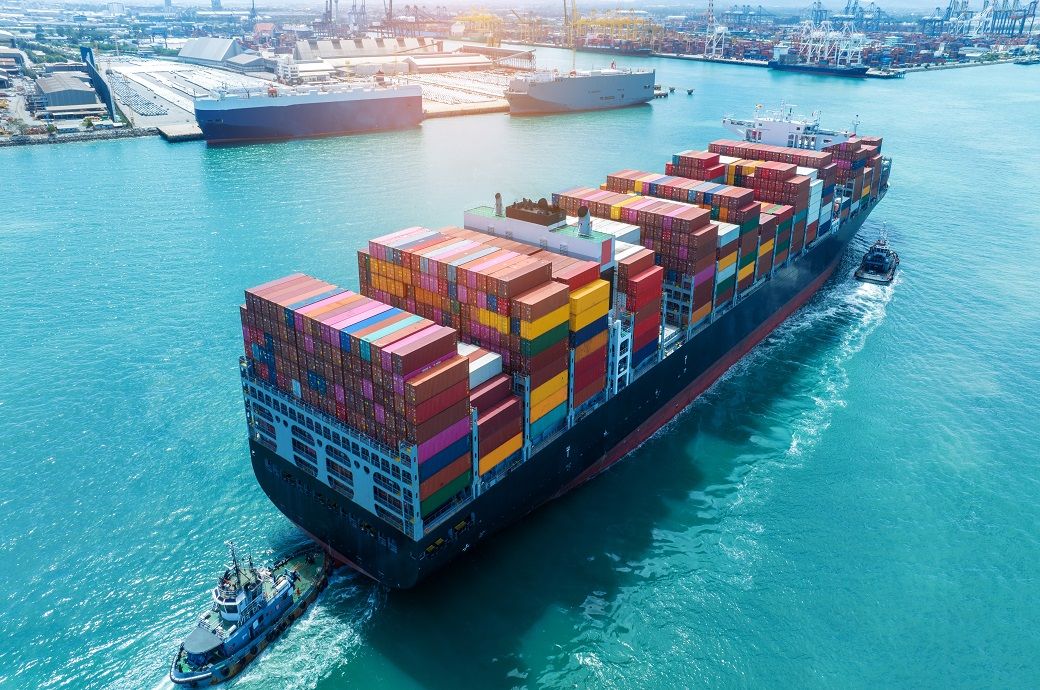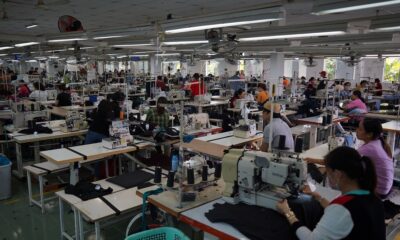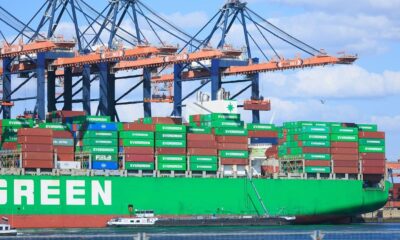Fashion
US Fed cuts rate by 25 bps; economic outlook uncertainty high: FOMC

This is the second rate cut in a row, aimed at safeguarding against rising uncertainties in the job market amid evident disagreements within the committee.
The US Fed’s Federal Open Market Committee (FOMC) has cut the key benchmark rate by 25 basis points to the 3.75- 4-per cent range—the second rate cut in a row, aimed at safeguarding against rising uncertainties in the job market.
“Uncertainty about the economic outlook remains elevated,” FOMC said.
Indicators suggest economic activity has been moderately expanding, Fed chairman Jerome Powell noted.
“Uncertainty about the economic outlook remains elevated,” the FOMC statement said.
“Available indicators suggest that economic activity has been expanding at a moderate pace. Job gains have slowed this year, and the unemployment rate has edged up but remained low through August; more recent indicators are consistent with these developments. Inflation has moved up since earlier in the year and remains somewhat elevated,” it observed.
“In considering additional adjustments to the target range for the federal funds rate, the Committee will carefully assess incoming data, the evolving outlook, and the balance of risks. The Committee decided to conclude the reduction of its aggregate securities holdings on December 1,” it said.
“The Committee is strongly committed to supporting maximum employment and returning inflation to its 2-per cent objective,” the statement added.
Committee members voted 10-2 to reduce the central bank’s primary lending rate. Fed governor Stephen Miran dissented, advocating for a larger 0.5-percentage point reduction, whilst Kansas City Fed president Jeff Schmid “preferred no change to the target range for the federal funds rate at this meeting,” according to the Fed statement.
Fed chairman Jerome Powell said though some key federal government data have been delayed due to the government shutdown, available public and private sector data suggest the outlook for employment and inflation has not changed much since the Fed meeting in September.
Available indicators suggest economic activity has been expanding at a moderate pace. GDP rose at 1.6 per cent in the first half this year, down from 2.4 per cent last year. Tariffs are pushing up prices in some categories of goods resulting in higher overall inflation. A further reduction in the policy rate at the December meeting is not a foregone conclusion, Powell added.
While the Fed has indicated potential additional rate reductions in December, the current lack of economic data creates additional uncertainty regarding their forthcoming decisions.
Fibre2Fashion News Desk (DS)
Fashion
US inks reciprocal trade agreement with Guatemala

“President Trump’s leadership is forging a new direction for trade that promotes partnership and prosperity in Latin America, further strengthening the American economy, supporting American workers, and protecting our national security interests,” said Ambassador Greer in a USTR release.
USTR Jamieson Greer and Guatemala’s Minister of Economy Adriana Gabriela Garcia recently signed the US-Guatemala Agreement on Reciprocal Trade.
The agreement addresses trade barriers facing American workers and producers, expands and solidifies markets for US exports and strengthens strategic economic ties in the Western Hemisphere, Greer said.
US trade body NCTO welcomed the signing.
The agreement addresses trade barriers facing American workers and producers, expands and solidifies markets for US exports and strengthens strategic economic ties in the Western Hemisphere, he said.
“This agreement builds on our long-standing trade relationship and shared interest in reinforcing regional supply chains,” he added.
The key terms of the agreement includes breaking down non-tariff barriers for US industrial and exports, advancing trade facilitation and sound regulatory practices; protecting and enforcing intellectual property; preventing barriers for digital trade; improving labour standards; strengthening environmental protection; strengthening economic security alignment; and confronting state-owned enterprises and subsidies.
Guatemala has committed to take steps to restrict access to central level procurement covered by its free trade agreement commitments for suppliers from non-free trade agreement partners, permitting exemptions as necessary, in a manner comparable to US procurement restrictions.
Welcoming the announcement, National Council of Textile Organizations (NCTO) president and chief executive officer Kim Glas said the agreement marks an important step toward strengthening the US textile supply chain.
“Guatemala is a key partner in the CAFTA-DR [Dominican Republic-Central America-United States Free Trade Agreement] region, with nearly $2 billion in two-way textile and apparel trade. Together, the region operates as an integrated co-production platform that is essential to the US textile supply chain,” he noted.
The US-Western Hemisphere textile and apparel supply chain remains ‘a critical strategic alternative’ to China and other Asian producers, he added.
Fibre2Fashion (DS)
Fashion
Canada could lift GDP 7% by easing internal trade barriers

Canada could boost long-term economic output by nearly 7 per cent if it dismantles policy-related barriers that restrict the movement of goods, services, and labour across provinces, according to new analysis by the International Monetary Fund (IMF).
Despite being one of the world’s most open economies globally, Canada’s internal market remains fragmented, with non-geographic barriers equivalent to an average 9 per cent tariff nationwide.
Canada could raise long-term GDP by nearly 7 per cent by removing internal trade barriers that restrict interprovincial movement of goods, services, and labour, new analysis shows.
Policy-related frictions act like a 9 per cent internal tariff nationwide.
Liberalising high-impact sectors could deliver productivity-led gains worth about C$210 billion (~$153.04 billion).
Model-based estimates suggest that fully removing these barriers could add around C$210 billion (~$153.04 billion) to real GDP over time, driven largely by productivity gains rather than short-term demand, IMF said in a release.
While full liberalisation will be gradual, targeted reforms in high-impact sectors could deliver sizable benefits and improve economic resilience. Analysts argue that stronger federal–provincial coordination, wider mutual recognition of standards and credentials, and transparent benchmarking of internal trade barriers will be key to turning Canada’s fragmented domestic market into a more integrated national economy.
Fibre2Fashion News Desk (HU)
Fashion
APAC freight market sees short-term surges, long-term overcapacity: Ti

While rates initially jumped in early January, weak underlying demand and the potential return of vessels to the Suez Canal are creating a volatile environment for shippers, it noted.
Carriers pushed through general rate increases (GRIs) in early January this year, briefly lifting China-to-US West Coast rates above $3,000 per forty-foot equivalent unit (FEU). However, these hikes were largely unsustainable due to weak volumes, with rates quickly correcting to the $1,800-$2,200 range by mid-month, the logistics and supply chain market research firm said in an insights brief.
Asia’s ocean freight market is navigating short-term seasonal surges and long-term structural overcapacity, Ti said.
Asia’s air freight market is seeing a significant ‘post-peak’ correction following a record-breaking end to 2025.
Warehousing capacity in the Asia-Pacific is under severe strain in late January as manufacturing slows and labour shortages emerge ahead of the Lunar New Year.
Seasonal demand ahead of the Lunar New Year (starting mid-February 2026) has pushed North Europe rates to roughly $2,700 per FEU as of mid-January. This is a significant recovery from the October 2025 lows of $1,300 per FEU.
Despite a peak ahead of the holiday, Intra-Asia rates have begun to ‘cool’ in mid-January, settling at an average of $661 per 40-feet container as new services and capacity entered the market.
The Asian air freight market is witnessing a significant ‘post-peak’ correction following a record-breaking end to 2025. While rates have dropped sharply from their December highs, demand remains resilient in key high-tech sectors, and a ‘mini-peak’ is expected in late January ahead of the Lunar New Year.
Spot rates from major hubs like Hong Kong and Shanghai fell significantly in early January as year-end peak season demand evaporated.
Despite the rate correction, global air cargo tonnages jumped by 26 per cent in the first full week of January 2026 compared to the end-of-year slump, with the Asia-Pacific region seeing an 8 per cent year-on-year (YoY) increase in chargeable weight.
Volumes from Southeast Asia to the United States rose by 10 per cent YoY in early January, driven by importers continuing to diversify sourcing away from China.
Warehousing capacity in the Asia-Pacific is under severe strain in late January as manufacturing slows and labour shortages emerge ahead of the Lunar New Year.
India closed 2025 with 36.9 million sq ft of warehouse leasing (16-per cent YoY growth), a trend continuing into early 2026 with high demand in Delhi National Capital Region and Chennai.
After a period of oversupply, development pipelines are expected to drop by a third by 2027, making 2026 a critical ‘inflection point’ for occupiers to secure quality space before terms tighten again.
Fibre2Fashion (DS)
-

 Sports6 days ago
Sports6 days agoPSL 11: Local players’ category renewals unveiled ahead of auction
-

 Entertainment6 days ago
Entertainment6 days agoClaire Danes reveals how she reacted to pregnancy at 44
-

 Business6 days ago
Business6 days agoBanking services disrupted as bank employees go on nationwide strike demanding five-day work week
-

 Tech1 week ago
Tech1 week agoICE Asks Companies About ‘Ad Tech and Big Data’ Tools It Could Use in Investigations
-

 Fashion1 week ago
Fashion1 week agoSpain’s apparel imports up 7.10% in Jan-Oct as sourcing realigns
-

 Sports6 days ago
Sports6 days agoCollege football’s top 100 games of the 2025 season
-

 Politics1 week ago
Politics1 week agoFresh protests after man shot dead in Minneapolis operation
-

 Politics6 days ago
Politics6 days agoTrump vows to ‘de-escalate’ after Minneapolis shootings
















